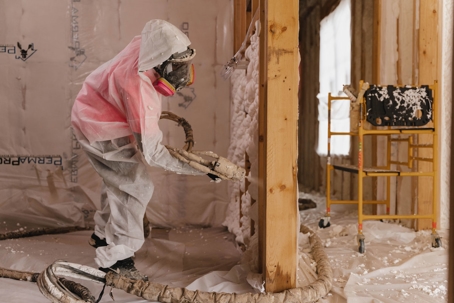How Thick Should Spray Foam Insulation Be?
Are you feeling the chill despite turning up the thermostat and bundling up in layers? If so, it might be due to insufficient insulation. Having old or improperly installed insulation will hinder a home’s efficiency. Homeowners planning a modern house insulation upgrade might wonder about the best thickness for spray foam. Discover how experts achieve the optimal spray foam thickness!
Consider Your Spray Foam Goals
Maximizing the benefits of spray foam insulation demands meticulous planning tailored to a building’s specific needs.
Choosing the standard thickness of spray foam insulation may seem adequate when creating an air seal and improving the thermal resistance of a home. However, it might require more foam when homeowners want to soundproof a room or lower their utility bills as much as possible.
In most cases, several inches of standard foam will work, depending on the types of spray foam used: open-cell or closed-cell foam. Still, the required thickness of the spray foam depends on the application location, R-value, and the specific outcomes homeowners aim to achieve.
Moisture Control
Insulation shields against harsh temperatures, often forming an air-seal barrier. Beyond temperature control, it also safeguards ceilings, floors, and walls against dampness. Spray foam insulation controls moisture around the house, which proves especially crucial when facing extreme weather or a damp climate.
Insulation protects a building from potential water damage and prevents mold growth. Professionally installed insulation will maintain a dry, healthy environment.
Energy Efficiency
For homeowners wondering why they have such high energy costs, it is probably due to defective home insulation.
Improperly installed coverings have tiny gaps that let outside air sneak into the house, resulting in the HVAC system, air conditioner, or heater going into overdrive to balance the temperature.
Having perfectly installed insulation will save residents from exorbitant bills.
Improved Indoor Air Quality
The right insulation thickness helps reduce seasonal allergies. By creating an impenetrable air seal, homeowners will keep allergens from entering their living space.
The best way to achieve an allergen-free environment is to use spray foam insulation. It provides an extra layer of protection against potential allergy triggers. So, how thick does spray foam insulation need to be? Let’s find out.
Recommended Spray Foam Thickness
The recommended thickness of spray foam varies depending on application and objectives. A single application of a thick foam layer may suffice for air sealing and thermal resistance. Contrary to common belief, multiple applications are not always required.
Similarly, spraying extra foam does not mean the house will have a higher R-value. The most important thing is achieving a proper air seal. Going beyond the recommended amount of foam for effective insulation will not provide additional benefits and will only increase the installation cost.
It is essential to rely on veteran insulation experts with extensive training to conduct an accurate foam thickness measurement. Listening to experienced pros will help homeowners achieve the best insulation results for their abode.
Open-Cell Spray Foam
Open-cell spray foam insulation is an excellent option for houses in milder climates. Although it may not look as thick as other types of insulation, it still provides ample protection against moderate weather conditions.
The open-cell spray foam insulation thickness recommended by experts is:
- Roof deck: 6-10 inches
- Ceiling: 6-10 inches
- Walls: 3 inches
Closed-Cell Spray Foam
Closed-cell spray foam offers optimal protection against extreme temperatures due to its dense structure and high R-value, delivering exceptional insulation. Ideal for regions experiencing both scorching summers and cold winters, this foam ensures year-round comfort by effectively regulating indoor temperatures.
The closed-cell spray foam insulation thickness recommended by experts is:
- Roof deck: 4-5 inches
- Ceiling: 4-5 inches
- Walls: 2-3 inches
Enjoy a Cozy Home with iFoam Insulation!
How thick does spray foam insulation need to be? Now that you know how thick spray foam should be, you can avoid over-spraying and enjoy a relaxing home by leaving it to the professional. Engage a top-notch insulation contractor to ensure your home remains comfy throughout the year. Call iFoam at (855) 935-4723 to discuss a professional installation today!





